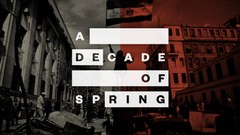Photo: VICE World News / YouTube
A decade after the seismic events of the Arab Spring, those who took to the streets reflect on what happened next.
Advertisement
Protesters in Baghdad in October 2019. Photo: Murtadha Sudani/Anadolu Agency via Getty Images
Advertisement
Protestors gather to attend anti-government demonstrationsat Tahrir Square in Baghdad in November 2019. Photo: Murtadha Sudani/Anadolu Agency via Getty Images
Advertisement
Protests in Baghdad in late 2019. Photo: AHMAD AL-RUBAYE/AFP via Getty Images
